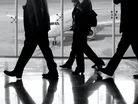8 corporate travel trends in 2022, reveals Deloitte

While corporate travel remains below 50% of pre-pandemic spend, it is expected to climb back steadily in 2022 but will look quite different, according to Deloitte’s new corporate travel report, Reshaping the landscape.
Here are eight corporate travel trends in 2022 and beyond.
1. Corporate travel didn’t reach 2021 expectations Business travel did not meet most companies’ expectations in the second half of 2021. One-third of travel managers surveyed in June 2021 expected to reach half of 2019 spend levels by the end of the year. Only 8% reached that mark, as the delta and omicron variants put a crimp in plans. COVID-19 variants stalled the recovery, and their impact could be lasting. Two-thirds of companies say variants and outbreaks in the second half of 2021 caused them to push back their timelines. Another 15% say variants triggered a significant rethink of their travel policies.
2. Corporate travel will experience a steady, but not meteoric, rise this year Spend is projected to reach 36% of 2019 levels in Q2 2022, and 55% by the end of the year. Business travel is at least two years from reaching pre-pandemic spend, as some travel use cases are expected to spur fewer trips over the long term. Health risks and directly pandemic-driven factors still present barriers to corporate travel but generate less concern than in 2021. Increased travel prices, however, remain a persistent concern.
3. Sales is top driver for return to corporate travel The top driver for a return to international travel aligns is sales – 43% of respondents rank sales visits among their top two reasons for sending travellers overseas in 2022. Leadership meetings (32%) and client project work (31%) follow in importance.
4. Conferences and events face another challenging year Conferences and events, which should see a resurgence domestically in 2022, face another challenging year with spend indicating the industry will not quickly bounce back to pre-pandemic levels. Nearly three in four say their firms will spend less on external conferences than in 2019. That said, improved attendance is expected with live events moving up three spots among triggers to increase travel, entering the top five. Companies are prioritising the most constructive events, monitoring who and how many attend, seeking events with a mix of powerful networking and content and looking for exceptional experiences. And travel managers rate content delivery more dependent on in-person, and less replaceable by technology, than they did in 2021.
5. Hotels cut back on services and amenities Two lean years and a labour crunch have hotels cutting back on services and amenities. As travel resumes, some companies are modifying their meetings contracts to ensure the availability of desired amenities in the face of these service cuts.
6. Alternative lodging options increase in business travel Alternative lodging options such as private rentals are finding their way into corporate travel but remain at a nascent stage. About one in 10 companies have non-traditional lodging in their booking tools. But half of the companies surveyed do not even reimburse employees for stays in non-hotel lodging.
7. Sustainability will push against future corporate travel spend Three in 10 companies expect sustainability to cause an 11%–25% reduction in travel budgets by 2025. Many companies are looking for sustainable partnerships, with one in three saying they are seeking guidance from travel management firms on how to reduce their carbon footprint, while 25% plan to prioritise travel suppliers that invest in sustainability.
8. Flexible working means more trips to headquarters The persistence of flexible working arrangements will necessitate more trips to company headquarters, but not for most companies. One in four companies say that more work from home (WFH) means more trips to headquarters. However, more WFH also means less travel overall. Companies that will be office-dominant by Q2 2022 are twice as likely to expect travel spend to reach 2019 levels by the end of 2023 as WFH-dominant ones. Airlines could find some incremental demand serving routes between established business hubs and destinations that have attracted big numbers of new residents since the pandemic began. While hotels in the right locations will have opportunities to attract these guests, and possibly offer attractive amenities for long stays or attractive billing models for repeat visitors.
- Is business aviation in India ready for takeoff?Lifestyle
- Cost control main priority as Australia CFO optimism fallsCorporate Finance
- Deloitte’s Kwasi Mitchell on embedding purpose into strategyLeadership & Strategy
- Executive interview: Deloitte Digital’s CCO Dounia SenawiLeadership & Strategy



